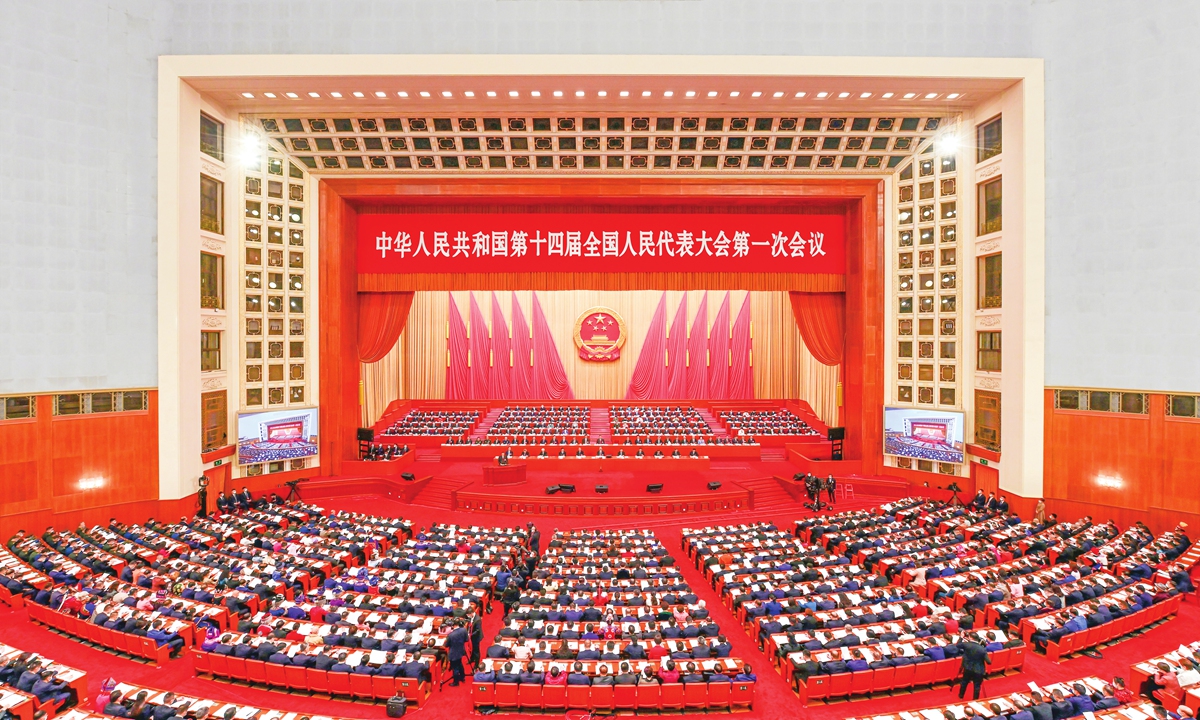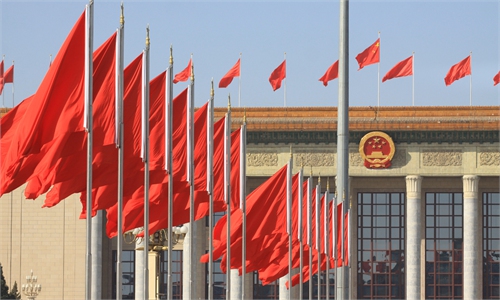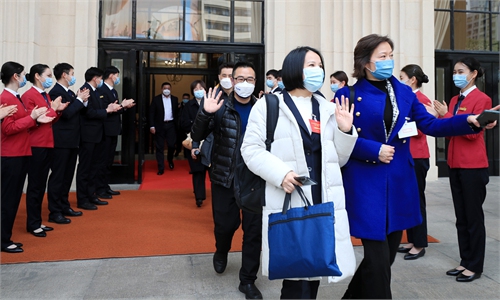China sets GDP target at around 5% for 2023, eyes quality growth
Nation will continue to be a locomotive for troubled global economy

The opening meeting of the first session of the 14th National People's Congress is held at the Great Hall of the People in Beijing on March 5, 2023. Photo: VCG
China has set its annual GDP growth target at around 5 percent for 2023, as the country embarked on a rapid economic recovery after a decisive victory against COVID-19, while putting emphasis on ensuring economic stability and high-quality growth, sustainable development amid global economic volatility and geopolitical uncertainty.While the growth target is reportedly the lowest in dozens of years, it still means China will continue to be one of the world's fastest-growing major economies, as the global economy is widely expected to further slow down this year and major economies such as the US and the EU are grappling with the risks of recession, analysts noted.
Many economists said that the world's second-largest economy will likely outperform the target despite facing a series of external risks and challenges, pointing to the country's accelerating recovery and solid economic fundamentals, as well as sufficient policy tools to tackle those risks and challenges.
Prioritizing stability
The GDP growth target, along with other economic development goals, was released in the Government Work Report delivered by Premier Li Keqiang on Sunday to the first session of the 14th National People's Congress (NPC).
"This year, it is essential to prioritize economic stability and pursue progress while ensuring stability. Policies should be kept consistent and targeted, and they should be carried out in a more coordinated way to create synergy for high-quality development," Premier Li said in the Government Work Report.
The economic target reflects policymakers' confidence in the country's economic performance this year, as China's economy has rebounded at a pace faster than anticipated in the two months after the country optimized its COVID-19 response, but authorities have taken potentially unexpected factors into consideration given the toughened geopolitical situation and global economic weakness, officials and experts said.
Zhang Yansheng, chief researcher of the China Center for International Economic Exchanges, told the Global Times on Sunday that China's economy might outperform the 5 percent target this year, and that the IMF is likely to further raise forecasts for China's economic growth to 5.8-6 percent this year.
The IMF recently forecast a GDP growth of 5.2 percent for China this year and 2.9 percent for global growth.
Cao Heping, an economist at Peking University, agreed with the assessment that China's economic performance will in all likelihood exceed the government target due to the country's strong growth momentum.
"China's GDP could rise by more than 6 percent in 2023 if the Russia-Ukraine conflict and international unilateralism does not escalate to a large degree... But officials set the GDP growth target at a little slower than that level to show their emphasis on high-quality development and pursuit of a sustainable growth pattern," he told the Global Times.
In the first two months of 2023, China's economy performed much better than expected in areas ranging from tourism and entertainment to manufacturing. Based on the fast recovery, global institutions have raised their forecasts for the country's economic growth this year.
Moody's recently raised its forecast for China's real GDP growth to 5 percent for both 2023 and 2024, up from previous projections of 4 percent, noting that the government's decision to optimize its COVID-19 response will naturally boost the country's economic activities.
Deloitte China Chair Jiang Ying told the Global Times on Sunday that the work report shows the government wants to take a balanced and holistic approach among short-term contingency measures and mid- and long-term development strategies, faced with rising uncertainty in the external environment and a fledgling domestic recovery that still need to be consolidated.
"An effective lift in quality and a reasonable increment in quantity is targeted here. And a 5-percent-growth target faces a high likelihood of being realized," she said.
By setting a 5 percent target, it means that China will function as the world's major economic engine this year, as the global economy is widely expected to slow amid geopolitical tensions and monetary policy fluctuations.
Tian Yun, a veteran macroeconomic observer, said that China's growth target this year will likely exceed most economies except countries that are at an early stage of industrialization, like Vietnam and India.
"As China's economic growth gathers pace, the country's contribution to global economic growth will return to about 30 percent this year," he told the Global Times.
Focusing on quality
Looking closely at policymakers' economic goals in specific areas, experts said that this year's economic targets reflect a policy emphasis on stability and high-quality development based on what they see as highlights of this year's Government Work Report.
Consumption has been prioritized, with Premier Li stressing in the Government Work Report that China should give priority to the recovery and expansion of consumption.
"Measures on boosting domestic demand, such as raising the income of mid- and low-income groups, boosting new-energy vehicle(NEV) sales and supporting the development of the elder care sector are likely to fully release people's consumption power from both the supply and demand-side," Jiang said.
The Government Work Report included preventing and defusing major economic and financial risks as one of the major priorities this year, while stressing that the transition to green development should continue.
The Report set higher other economic indicators compared with last year. For example, China's deficit-to-GDP ratio is projected at 3 percent for 2023, 0.2 percentage points higher than 2022, which signifies more active fiscal stimulus. The government has set a higher goal for employment, targeting the creation of 12 million new urban jobs in 2023, compared with the target of "more than 11 million" last year.
"Those highlights point to one thing: that the government is putting more focus on high-quality development instead of just chasing numeric targets," Tian said, adding that the targets show policymakers' "bottom-line" thinking as they want to secure long-term, stable economic growth.
Chen Jia, a macroeconomic observer, told the Global Times that compared with the traditional "GDP growth test," local governments will likely put more focus on achieving detailed economic targets related to people's livelihood such as employment and inflation.
"China might have set its GDP target at a relatively conservative level and with more flexibility, but it will continue to urge local governments to take on the responsibility of ensuring people's livelihood," Tian said.
Tackling risks
Observers stressed that although China's economy has presented promising signs in recent weeks, the country is still facing multiple headwinds ranging from external demand fluctuations to US monetary policies.
Zhang pointed out that this year's economic growth still faces a number of challenges, the first of which is insufficient external demand.
"This year will be even tougher for the global economy, with the WTO predicting that global trade will grow by only 1 percent. Therefore, although the target of 5 percent economic growth is relatively modest, some local governments may still have difficulties in achieving it. This is why the Government Work Report put expanding domestic demand as the top priority of the eight major tasks in 2023," Zhang said.
Cao said that the biggest factor of uncertainty comes from changes in the external environment, such as whether some developed economies will plunge into economic recession, which will in turn drive down demand for Chinese exports.
The negative impact from the US' interest rate hikes might also intensify, Tian Yun said, as rate hikes are draining liquidity in the international markets. For China, it will also trigger capital outflow which will pose hazards for China's economic recovery.
Tian nevertheless stressed that China's policies are independent and has ample room for further maneuver. This, plus the fact that China's economy is in an upward cycle, will place China in a better position than Western markets to withstand the risks ahead.




